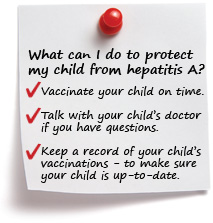Hepatitis A - Fact Sheet for Parents
Diseases and the Vaccines that Prevent Them
Español: Hepatitis A
Printer friendly version[398 KB, 2 pages]
Benefits of the hepatitis A vaccine
- Saves lives.
- Protects against serious disease.
- Keeps others safe.
Side effects of the Hepatitis A vaccine
The most common side effects are usually mild and last 1 or 2 days. They include the following:
- Sore arm from the shot in about 1 out of 2 people.
- Headache in about 1 out of 6 people.
- Tiredness in fewer than 1 out of 10 people.
- Fever in fewer than 1 out of 10 people.
- Loss of appetite (not wanting to eat) in about 1 out of 12 people.
What is hepatitis A?
Hepatitis A is a serious liver disease caused by the hepatitis A virus. Children with the virus often have no symptoms, but they can pass it on to their parents or caregivers, who can get very sick. The hepatitis A vaccine protects against this disease.
What are the symptoms of hepatitis A?
Children under 6 years old usually have no symptoms.
Older children and adults feel very sick and weak. Symptoms may include the following:
- Fever
- Loss of appetite (not wanting to eat)
- Tiredness
- Stomach pain
- Vomiting
- Dark urine
- Yellow skin and eyes
People feel sick 2 to 6 weeks after they get the hepatitis A virus.
How serious is hepatitis A?
Most people with hepatitis A feel very sick for about 2 months. Some people are sick for up to 6 months.
There is no specific treatment for hepatitis A. Some people with hepatitis A get so sick that they need care in the hospital. About 100 people in the U.S. die each year from liver failure caused by hepatitis A.
How does hepatitis A spread?
Hepatitis A virus is found in the stool (feces) of a person who has the virus. It spreads when a person puts something in his or her mouth that has the hepatitis A virus on it. Even if the item looks clean, it can still have virus on it from stool that can spread to others. The amount can be so tiny that it cannot be seen with the naked eye. It can spread by touching objects such as doorknobs or diapers that have virus on them.
The virus spreads easily from one family member to another.
People are most likely to spread hepatitis A virus in the 2 weeks before they feel sick.
Sometimes the virus can get into food or water. If this happens, the virus can quickly spread to anyone who eats or drinks the affected food or water. But this is uncommon in the United States.
 What is the hepatitis A vaccine?
What is the hepatitis A vaccine?
The hepatitis A vaccine prevents hepatitis A disease. It is made from killed (inactivated) virus. The vaccine protects children by preparing their bodies to fight the hepatitis A virus.
Almost all children (at least 94 children out of 100) who get two doses of the vaccine will be protected from hepatitis A.
When should my child get the hepatitis A vaccine?
Children should get the hepatitis A vaccine at 12 through 23 months of age. Vaccine can be less effective if given before 1 year of age. Those who do not get the vaccine by age 2 should get the shot at their next doctor visit.
The vaccine is given in two doses, at least 6 months apart. Children can get the hepatitis A vaccine at the same time as other vaccines.
Why should my child get the hepatitis A vaccine?
Hepatitis A is the most common type of hepatitis among children. Getting your child the hepatitis A vaccine protects him against this serious disease 20 years or longer. It can also protect other people. Because children rarely have symptoms, they often pass hepatitis A on to others without anyone knowing they were infected.
Is the hepatitis A vaccine safe?
The hepatitis A vaccine is very safe, and it is effective at preventing hepatitis A disease. Vaccines, like any medicine, can have side effects. But no serious side effects have been confirmed for the hepatitis A vaccine.
About half of the people who get the hepatitis A vaccine will have no side effects at all. In the other half of people, most report having very mild side effects, like a sore arm from the shot.
If my child does not get the hepatitis A vaccine, will he get the disease?
Because of the use of hepatitis A vaccine, the number of cases of the disease in the U.S. has dropped. But about 20,000 people still get hepatitis A each year. A child who is not vaccinated is at risk for getting hepatitis A.
Where can I learn more about the hepatitis A vaccine?
To learn more about the hepatitis A vaccine or other vaccines, talk to your child’s doctor.
Call 800-CDC-INFO (800-232-4636) or go to the CDC Vaccines web site and check out the following resources:
Fact Sheets for Parents
Diseases and the Vaccines that Prevent Them
![]() This symbol means you are leaving the CDC.gov Web site. For more information, please see CDC's Exit Notification and Disclaimer policy.
This symbol means you are leaving the CDC.gov Web site. For more information, please see CDC's Exit Notification and Disclaimer policy.
Copyrighted images: Images on this website which are copyrighted were used with permission of the copyright holder and are not in the public domain. CDC has licensed these images for use in the materials provided on this website, and the materials in the form presented on this website may be used without seeking further permission. Any other use of copyrighted images requires permission from the copyright holder.
Contact Us:
- Centers for Disease Control and Prevention
1600 Clifton Rd
Atlanta, GA 30333 - 800-CDC-INFO
(800-232-4636)
TTY: (888) 232-6348 - New Hours of Operation
8am-8pm ET/Monday-Friday
Closed Holidays - cdcinfo@cdc.gov




